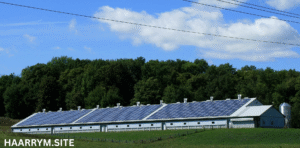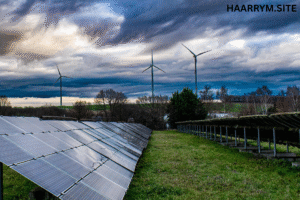Among the most consistent and sustainable sources of electricity available nowadays is solar energy.
“Do solar panels work on cloudy days?” many homeowners wonder, nevertheless, before they install solar panels.
Indeed, can solar panels still provide power if the sun is not shining brilliantly?
We will explore in great detail in this blog article how solar panels function under cloud cover, dispel some common misconceptions, and provide you useful ideas on what you could get from your solar energy system on those gray, cloudy days.
Comprehending Solar Panel Energy Generation
Knowing how solar panels function initially helps one to better grasp their behavior on overcast days.
Photovoltaic (PV) cells make up solar panels. These cells create direct current (DC) power by capturing sunlight.
Your house runs on alternating current (AC), which an inverter subsequently turns DC energy into.
Thus, indeed, solar panels need sunshine to produce electricity. That does not imply, however, that they cease functioning totally when clouds pass by.
On Cloudy Days, Are Solar Panels Effective?
Short Answer: Yes, but at reduced efficiency.
Though their efficiency may decline to between 10% to 30% of their regular output depending on the thickness of the cloud cover, solar panels do operate on overcast days.
This may surprise you, but solar panels can still gather diffuse sunlight—that which molecules in the atmosphere and clouds have dispersed. Enough sun energy gets to the Earth on even grey days to create power.
Cloudy But Bright vs Stormy and Dark
Not every gray day is made equally. The kind of cloud cover affects how much power your panels create:
-
High clouds or light overcast: Solar panels might still run between 50% and 70% efficient.
-
Storms or thick cloud cover: Might cause efficiency to fall between 10% and 25%.
There are days when cloud cover is so minimal that solar panels run almost fully.
Through the “edge of cloud effect,” in which sunlight is amplified by the cloud edges like a lens, light clouds surprisingly may even momentarily improve performance.
Real-World Illustrations: Cloudy Locations Profably Powered by Solar Energy
Still dubious? Imagine this:
Among the leaders in solar energy generation worldwide is Germany, a nation well-known for its hazy, wet climate.
Both London and Seattle, with their regular cloudy clouds, have increasing solar installations.
This indicates that solar energy is not just for sunny places like California or Arizona.
Proper design, system size, and storage let solar panels run well even in areas with little sunlight.
On Days with Clouds, How Much Power Do Solar Panels Generate?
On a gloomy day, solar panels may often produce 10% to 30% of their stated capacity.
Here is a general guide of what to anticipate:
| Weather Condition | Calculated Effectiveness |
|---|---|
| Complete sun | 100% |
| Light clouds | Between 60% and 80% |
| Moderate clouds | Between 30% and 50% |
| Heavy clouds | 10% to 30% |
| Days with rain or storms | 5%–15% |
Note: These are approximations; panel quality, system orientation, and location will affect them.
What Affects Cloudy Day Solar Panel Performance?
Several factors affect the performance of your solar system under cloud cover:
1. Panel Efficiency and Quality
Premium solar panels—like those from SunPower or LG—are designed to operate in low light.
They make use of cutting-edge technologies that maximize light absorption like PERC cells and monocrystalline silicon.
2. Thermal Coefficient
Actually, in colder climates, solar panels are more efficient.
Even if sunlight is less on gloomy days, lower temperature may aid to lessen overheated losses.
3. Angle and Orientation of a Panel
Your panels will run better year-round, even on cloudy days, if they are slanted best for the latitude of your area.
4. Shading and Blockage
Further lowering sun output are trees, buildings, or chimneys that provide extra shadow under cloud cover.
A expert site evaluation is thus very vital.
On Cloudy Days, Might Solar Batteries Help?
Right. Including battery storage will help to guarantee energy security even when solar production declines.
On bright days, solar batteries—like the Tesla Powerwall or Enphase IQ Battery—allow you to save extra energy created for use during dark or gloomy evening hours.
This reduces grid dependency and allows you to retain your energy independence.
Advice on Maximizing Solar Performance in Cloudy Conditions
-
Make high-efficiency panel investments. Search for panels that excel in low light levels.
-
See your panels often for maintenance. On days with clouds, dirt or trash may obscure even the little sunshine that passes through.
-
Install a solar battery system to store energy during low production times.
-
Use an energy monitoring system. Track your solar output and adjust your use to match.
-
Cut surrounding trees or barriers to lessen shadow on otherwise clear circumstances.
Is Solar Still Worth It in Areas with Clouds?
Correct. Solar panels may dramatically lower your carbon footprint and power use even in places with plenty of foggy days.
A well-designed system will consider the temperature of your area and have adequate capacity or storage to offset seasonal variations.
Extended Return on Investment
Although the payback time may be somewhat longer in areas with clouds, solar is a good investment considering long-term cost savings and environmental advantages.
Furthermore, municipal incentive schemes, net metering, solar tax credits help you increase your return on investment even in less sunny areas.
Typical Stories Regarding Cloudy Days and Solar Panels
Let’s bust some popular misconceptions:
-
Myth: Solar panels cannot function without direct sunshine.
Fact: Though less well, they also handle diffuse light. -
Myth: Solar only fits sunny states.
Fact: Solar adoption is helping nations and towns with little sun flourish. -
Myth: On days when it clouds, you won’t receive any power.
Fact: Panels still producing, although at lowered rates.
Last Thoughts
Do solar panels then operate on days with clouds? Indeed, they most definitely do.
Even under gloomy situations, solar power remains a reasonable and sensible energy source even if their efficiency may decline; with the aid of batteries, clever design, and high-efficiency panels, solar power stays useable.
See a qualified installer who can evaluate your site and design a customized system fit for year-round performance if you are thinking about going solar but are worried about local weather.
Search Solar for Your House Here
Allow us to assist you in creating a system that runs independent of the season.
We have solar options that fit you whether your residence is sunny Arizona or rainy Oregon.

